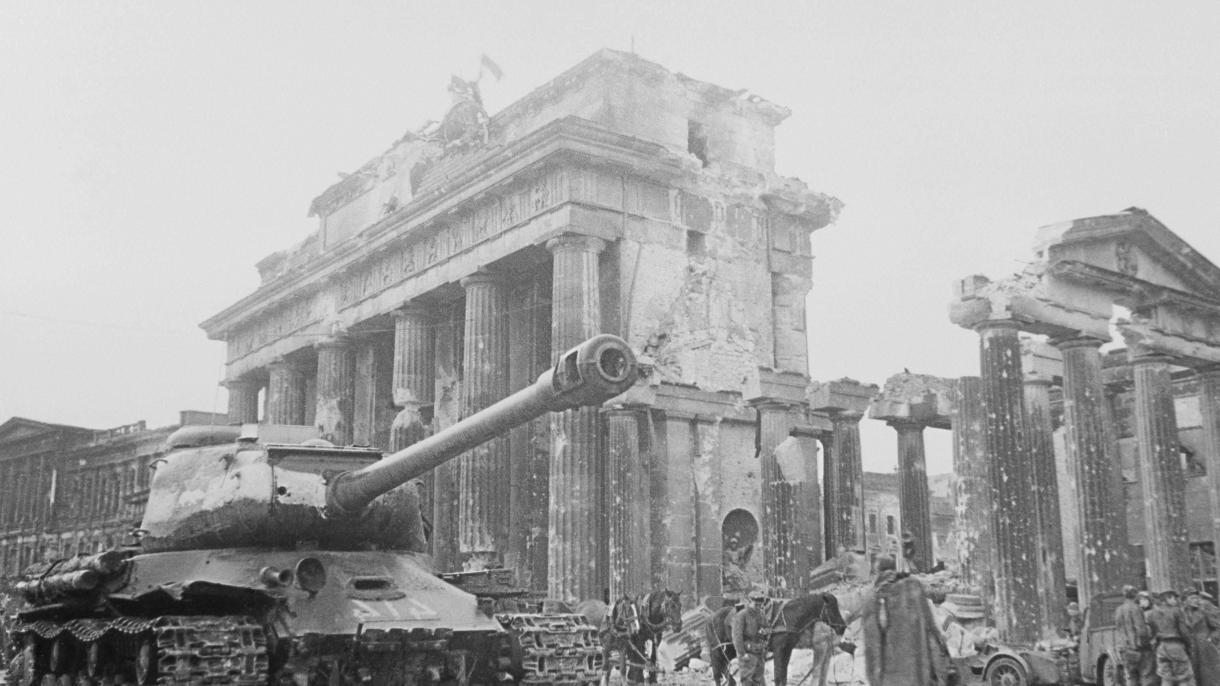
Event
- Monday, 19. May 2025 – Tuesday, 20. May 2025 Save in my calendar
1945-2025: 80 years of narratives about the end of World War II
13th European History Forum
In April and May 2025, Europe will commemorate the 80th anniversary of the end of the Second World War in Europe. Yet, can this anniversary serve as a unifying moment for the continent?
As Europe marks this milestone, it does so in the shadow of the most extensive armed conflict on the continent since 1945—Russia's war of aggression against Ukraine. The year 1945 remains a profound historical rupture in the collective memory of European societies. However, despite extensive historiographical inquiry, interpretations of this rupture remain contested. Was it defined primarily by the defeat of National Socialist Germany by the Allied forces? The liberation of Eastern and Southeastern Europe from fascist rule by the advancing Red Army? The triumph of anti-fascist resistance movements, aspiring to establish a Europe of independent and homogeneous nation-states? Or was it, for some, the mere replacement of one oppressive regime—the Nazi dictatorship—by another—the Soviet system? Perhaps it was the initiation of a judicial reckoning with Nazi atrocities through the Nuremberg Trials, which laid the groundwork for contemporary international law.
These and numerous other narratives surrounding 1945 have undergone continuous transformation over the past eight decades. Such shifts are attributable not only to evolving historiographical insights but also to changing political contexts. Interpretations of the Second World War and the post-war order have historically diverged—not only between Eastern and Western Europe but also within the respective former Cold War blocs. The ways in which societies memorialize decisive historical events are inevitably shaped by national and regional perspectives. However, 1945 stands as a particularly striking example of how official commemorations are often influenced by political agendas and propaganda. In contemporary Russia, for instance, President Vladimir Putin frames his war of aggression against Ukraine within the historical legacy of the Red Army’s anti-fascist struggle. Within this framework, challenging the official narrative of 1945 can result in severe legal repercussions, including imprisonment.
The European History Forum of 2025 will explore the end of the war as experienced in various countries across Central, Eastern, and Southeastern Europe. The discussions will address shifts in both official and societal discourses about 1945 over recent decades, particularly in light of the Russian invasion of Ukraine. Additionally, the forum will examine the political visions of resistance movements against the Axis powers and the legal and societal processes of reckoning with war crimes in the post-war period.
Simultaneously, the forum will provide a platform for scholars and practitioners from the fields of historical studies, media, museums, and non-governmental organizations with a focus on Eastern and Southeastern Europe. Participants will have the opportunity to network and showcase innovative research, didactic approaches, and remembrance initiatives. The forum remains committed to fostering a multi-perspective European culture of memory—one that prioritizes international dialogue, scholarly collaboration, and the advancement of critical, independent historiography and historical pedagogy.
With
- Jaroslav Hrytsak, Catholic University, Lviv
- Claudia Weber, European University Viadrina, Frankfurt/O.
- Elma Hašimbegović, Historical Museum of of Bosnia and Herzegovina, Sarajevo
- Andi Pinari, University of Tirana
- Iryna Kashtalian, Buchenwald Memorial, Weimar
- Sergey Rumyantsev, Center for Independent Social Research (CISR), Berlin
- Oksana Khomiak, Kyiv-Mohyla Academy
- Vjeran Pavlaković, University of Rijeka
et al.
The event will be held in English.
Information:
Nina Happe
East and Southeast europe Division
E nina.happe@boell.de
T+49 (0)30 285 34 384
Please register for the event.
» Participation on site
at the the Heinrich-Böll-Stiftung Conference Center, Schumannstr. 8, 10117 Berlin
Please register in advance. Unfortunately, the number of seats for this event are limited. If we are at capacity, the conversation will be transmitted via video to other rooms.
» Livestream
Alternatively, you can follow the event via the livestream without registering.
Livestream in English on May 19, 2025
Files
- Dates
- Mon, 19. May 2025 (Europe/Berlin) 10:00 am – 8:30 pm Save in my calendar
- Tue, 20. May 2025 (Europe/Berlin) 10:00 am – 5:30 pm Save in my calendar
- Timezone
- Berlin
- Address
-
Heinrich-Böll-Stiftung - Headquarter Berlin
Schumannstr. 8
10117 Berlin
- Accessibility
- Language
- English
- Livestream
- Watch livestream
